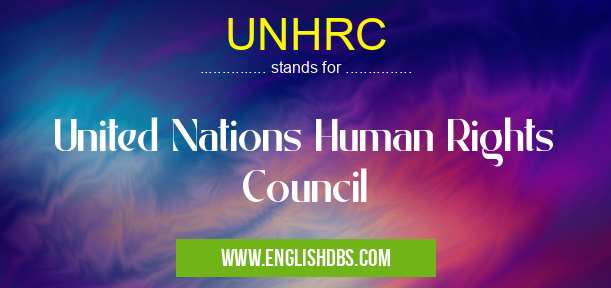What does UNHRC mean in UNITED NATIONS
The United Nations Human Rights Council (UNHRC) is an inter-governmental body within the United Nations system responsible for strengthening the promotion and protection of human rights around the world. The UNHRC is comprised of 47 members elected by the United Nations General Assembly, and its mandate includes monitoring and reporting on current human rights issues, recommending further action to be taken and coordinating responses between various government bodies. By fostering dialogue among governments and non-governmental organizations, the UNHRC strives to promote greater understanding of human rights principles and their implementation in all countries.

UNHRC meaning in United Nations in Governmental
UNHRC mostly used in an acronym United Nations in Category Governmental that means United Nations Human Rights Council
Shorthand: UNHRC,
Full Form: United Nations Human Rights Council
For more information of "United Nations Human Rights Council", see the section below.
UNHRC Meaning in Governmental
In governmental terms, UNHRC stands for United Nations Human Rights Council. As mentioned above, it is an inter-governmental body that is tasked with protecting and promoting human rights around the world. The council meets regularly in Geneva, Switzerland, in order to develop strategies to address global challenges related to human rights. It works with governments across the globe in order to ensure that they are acting according to international standards when it comes to treating people within their own borders.
UNHCR Full Form
The full form of UNHRC is United Nations Human Rights Council. This organization was established by the United Nations General Assembly in 2006 as a result of merging two other organizations – namely, the Commission on Human Rights (CHR) and Sub-Commission on Promotion and Protection of Human Rights (SPPDHR). The main objectives of this body are to protect all individuals from violations of their basic human rights, regardless of their faith or ethnicity; provide access to justice for those whose rights have been violated; combat racism; promote mutual respect among nations; protect vulnerable and minority groups; promote freedom of expression; combat discrimination based on gender identity or sexual orientation; promote economic social development; eliminate poverty worldwide; improve living conditions for refugees; work towards abolishing capital punishment globally; prevent torture against persons under any form of detention or imprisonment and support measures upholding international humanitarian law during armed conflicts.
Essential Questions and Answers on United Nations Human Rights Council in "GOVERNMENTAL»UN"
What is the United Nations Human Rights Council?
The United Nations Human Rights Council (UNHRC) is an inter-governmental body within the United Nations (UN) system responsible for promoting and protecting human rights around the world. It also works to prevent discrimination, protect basic freedoms, and ensure civil and political liberties for all people.
Who are members of the United Nations Human Rights Council?
The UNHRC consists of 47 Member States who are elected by an absolute majority in a secret ballot by the United Nations General Assembly. Member States are elected for three-year terms and can be re-elected to two additional consecutive terms.
Where is the United Nations Human Rights Council located?
The UNHRC is headquartered at the Palais des Nations in Geneva, Switzerland, but its primary workspace is divided between its New York office and field offices located throughout the world.
How often does the United Nations Human Rights Council convene?
The UNHRC holds regular meetings three times per year in March, June and September at its headquarters in Geneva. Additionally, it may organize special sessions on particular topics such as genocide or torture when needed. Plenary meetings are usually open to all UN member states, representatives of non-governmental organizations (NGOs), National Human Rights Institutions (NHRIs), members of specialized agencies and regional arrangements across different parts of the world.
What is on the agenda for each meeting of the UNHRC?
During meetings, several items are discussed on behalf of multiple countries aiming to promote international cooperation on human rights matters around the globe. Agenda items may include issues concerning civil, political, economic, social and cultural rights as well as those related to protection of vulnerable groups such as children or women’s rights.
What initiatives does the United Nations Human Rights Council pursue?
The UNHRC promotes awareness about international human rights standards through educational outreach activities; conducts studies about particular cases like mass atrocities; drafts resolutions which suggests solutions to global human rights predicaments; appoints independent experts on particular themes; publishes reports with recommendations; makes decisions about sending missions to areas with humanitarian crises; raises funds for assistance programs…and many other initiatives designed to help improve worldwide situations concerning human rights.
Does anyone observe or participate at meetings of UNHRC?
Yes! In addition to Member States representatives attending meetings addressed by heads of states or governments from other countries, NGO representatives also participate by providing statements regarding their area of expertise resulting in collective action taken towards overcoming difficult human rights scenarios from around the planet.
What tools does UNHRC use in achieving its goals?
Among other procedures used by UNHRC includes country visits undertaken by Commission Special Procedures mandate holders that investigate possible violations during specific periods inside given locations helping them make accurate reports so possible solutions can be proposed.
Final Words:
The United Nations Human Rights Council (UNHRC) acts as a guardian of universal human rights around the world as it evaluates international compliance with established standards in this regard. Furthermore, it also works towards finding solutions that address instances where existing laws fail to provide sufficient protection for vulnerable individuals such as victims of violence or discrimination due to their faith or ethnicity. Overall, UNHRC seeks to foster mutual respect among nations through its initiatives so that everyone can live without fear knowing they have access to justice no matter where they may be located geographically or socially.
